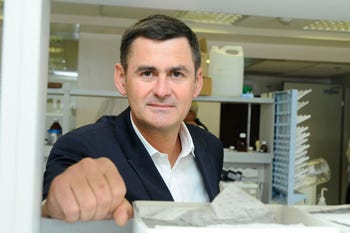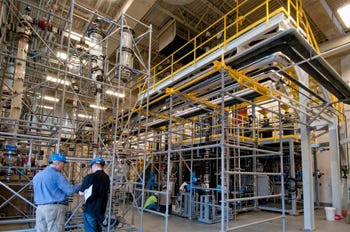Manufacturers of bioplastics, biofuels, and biochemicals have a new non-food-derived feedstock option for their products. Virdia, formerly HCL CleanTech, is commercializing a patented technology that converts cellulosic biomass into fermentable sugars and lignin. In addition to the new name, the company formally introduced its new CEO, longtime the industrial biotech veteran Philippe Lavielle. Lavielle replaces Virdia's co-founder, Eran Baniel, as CEO, with Baniel now acting as Virdia's VP of business development.
March 8, 2012
Manufacturers of bioplastics, biofuels, and biochemicals have a new non-food-derived feedstock option for their products. Virdia, formerly HCL CleanTech, is commercializing a patented technology that converts cellulosic biomass into fermentable sugars and lignin. In addition to the new name, the company formally introduced its new CEO, longtime the industrial biotech veteran Philippe Lavielle. Lavielle replaces Virdia's co-founder, Eran Baniel, as CEO, with Baniel now acting as Virdia's VP of business development.
Phillipe Lavielle, Virdia CEO |
Above, Virdia CEO, Philippe Lavielle, below, Virdia's semi-works plant. |
Virdia plant |
Lavielle told PlasticsToday that he's actually been working with the company since July, as it worked to transition into a commercialization phase. The first step in that transition will be selecting a site for its first production-scale plant. The company has chosen the state of Mississippi for the facility on the basis of "sustainable access to biomass" and a $75 million financial incentive package tendered by the Mississippi Development Authority, according to Lavielle.
Lavielle said the company hopes to be done with the site selection process in 6 to 9 months, with an operation in place and running by the end of 2014 or early 2015. The anticipated output will be 150,000 tons of sugar, a "modest" amount, Lavielle said, with future plants to be in the range of 500,000 tons/yr. Lavielle noted that even at the current size, the planned facility's production would be equivalent to a plant producing 60-70 million gallons of ethanol annually.
Virdia will offer the marketplace C5 and C6 sugars and lignin. In addition to biofuels and biochemicals, the sugars offer a pathway to PET precursor, paraxylene, with the lignin applicable to carbon fiber creation and flame retardants. Asked which market he anticipates being the most robust among bioplastics, biochemicals, and biofuels, Lavielle laid out the attraction position Virdia finds itself in.
"That's the beauty of being the first step in the value chain," Lavielle said. "We're indifferent," adding that the company's role is to make a new non-food based carbohydrate available for conversion.
To fund its piloting activities and engineering plans, Virdia recently closed its latest round of financing, raising over $20 million from insiders, Khosla Ventures, Burrill & Company and Tamar Ventures. In addition, the company closed $10 million in a venture debt deal with Triple Point Capital. The state of Mississippi's package included $75 million in low-interest loans, as well as up to $155 million in various tax incentives over a 10-year period. Virdia expects its cellulosic sugar plants to create hundreds of new jobs over the same decade.
Virdia's intellectual property portfolio is built arounds its CASE proprietary process for converting a wide range of cellulosic feedstock, including wood, energy crops and agricultural residues into refined sugars and lignin. Described as a low-temperature process that delivers the high yields of sugars from biomass, it is said to have a small environmental footprint due to the near complete recycling of acids and solvents used in manufacturing.
In January, Virdia (then HCL CleanTech) and Virent Energy Systems Inc. were awarded a $900,000 grant from BIRD Energy, a program for U.S. - Israel joint renewable energy development funded by the U.S. Department of Energy, the Israeli Ministry of National Infrastructures, and the BIRD Foundation. Virent was one of the company's named by Coca-Cola as a research partner in its effort to create a 100% renewably sourced PET bottle. Per the Virent/Virdia deal, sugars processed at Virdia's Durham, NC demonstration plant are sent to Virent's Madison, WI facility for conversion into biofuels and biochemicals. As part of the BIRD project, HCL CleanTech will also provide pine sugars to an unnamed biopolymer producer for evaluating fermentation into hydrocolloids that historically were made from cane or corn sugars for use in personal care, food and beverage applications.
About the Author(s)
You May Also Like




